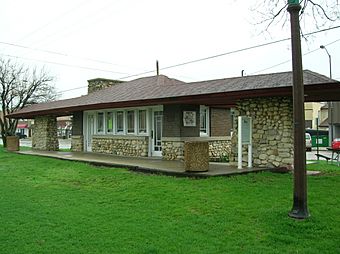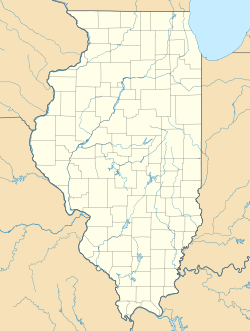Ardmore Avenue station (Illinois) facts for kids
Quick facts for kids |
|
|
Ardmore Avenue Train Station
|
|

The former Ardmore Avenue CA&E station.
|
|
| Location | 10 West Park Avenue Villa Park, Illinois |
|---|---|
| Area | less than one acre |
| Built | 1910 |
| Architect | Ballard & Pottinger |
| NRHP reference No. | 80004525 |
| Added to NRHP | November 21, 1980 |
The Ardmore Avenue station is a historic building in Villa Park, Illinois. It was once a busy train station for the Chicago Aurora and Elgin Railroad (CA&E). This station, along with the Villa Avenue station, was one of two CA&E stations in Villa Park. Because of its importance, it was added to the National Register of Historic Places in 1980.
History of the Ardmore Train Station
The Ardmore Avenue station was built in 1910. A real estate company called Ballard & Pottinger built it. They wanted to encourage people to buy land and build homes nearby. The plan worked very well! So many people moved to the area that the town of Villa Park was officially created in 1917.
This station served train passengers for many years. However, the CA&E railroad faced money problems. On July 3, 1957, the train line suddenly closed down. The Ardmore Avenue station is special because it is one of only a few stations left from the original seventy-three CA&E stations. On November 21, 1980, the station was recognized as a historic site. It was placed on the National Register of Historic Places.
Today, the old station building has a new purpose. It is now the main office for the Villa Park Chamber of Commerce. The building is also located along the Illinois Prairie Path. This path is a popular trail for walking and biking. It was built on the old train tracks where the CA&E trains used to run.
What the Station Looks Like
The Ardmore Avenue station is a one-story building. It was designed in an English style. It mostly served as a comfortable place for passengers to wait for their trains.
The building has stone walls. Its doors and windows are made of wood. Strong steel beams, called lintels, are above the doors and windows. The roof is made of tiles. It has metal gutters and a brick chimney. A decorative wooden border, called a cornice, runs along the top of the building. Inside, the station could be warmed by a fireplace. It also had electric lights. Windows are on all sides of the building. Two doors on the north side led out to the train platform. The inside of the station used to have wooden benches and special flip-top seats for passengers.
| Preceding station | Chicago Aurora and Elgin Railroad | Following station | ||
|---|---|---|---|---|
| Westmore
toward Wheaton
|
Main Line | Villa Avenue
toward Chicago
|
||
 | Percy Lavon Julian |
 | Katherine Johnson |
 | George Washington Carver |
 | Annie Easley |



